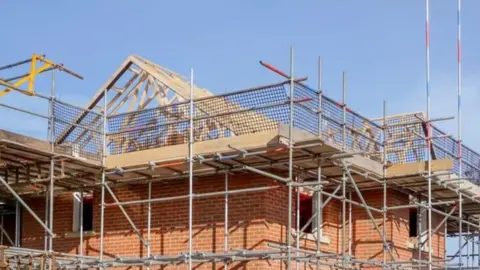North Somerset Council could pull out of 100,000 homes plan
 Getty Images
Getty ImagesA plan for more than 100,000 houses in the west of England could be rejected by one of the councils that drew it up.
The Joint Spatial Plan (JSP), created by four local authorities, set out the long-term housing and infrastructure needs of the region to 2036.
But it was rejected by government planning inspectors last year.
Now North Somerset Council has announced it wants to withdraw, with the other authorities expected to follow suit.
A dozen sites surrounding Bristol had been identified for significant numbers of new homes in so-called "garden villages".
Residents near the proposed sites had started campaign groups against the scheme.
Planning inspectors found "significant concerns" when considering the proposals from Bristol, South Gloucestershire, North Somerset, and Bath and North East Somerset councils.
They said it was unlikely they would find the plan "legally sound" because they could not be certain the sites had been determined on a "robust, consistent and objective" basis.
'Waste of public money'
When the JSP was drawn up North Somerset Council was run by the Conservatives but the party lost 23 seats at last year's election, leaving no party in overall control and Independents the largest group.
The decision to withdraw will be considered by the council on Tuesday. It proposes to develop its own plan over the next 15 years.
Councillor James Tonkin, who is responsible for planning and is one of the Independents, said there needed to be better public consultation this time round.
"We're starting with a clean sheet of paper. The essential thing is we've got to find between 25 and 30,000 more houses in the period 2026-36. They've got to go somewhere." he said.
The council would introduce the idea of building on green belt lane, which had not been considered previously, he added.
The move was welcomed by Jan Murray, from Churchill and Langford Residents Action Group. Almost 3,000 homes would have been built near the two villages under the JSP.
"It was inevitable that it had to be withdrawn," she said.
"Frankly it didn't make sense to build remote strategic development locations away from the employment centre of Bristol, which is where the jobs are needed and where there is the housing problem. It was a huge waste of public money."
